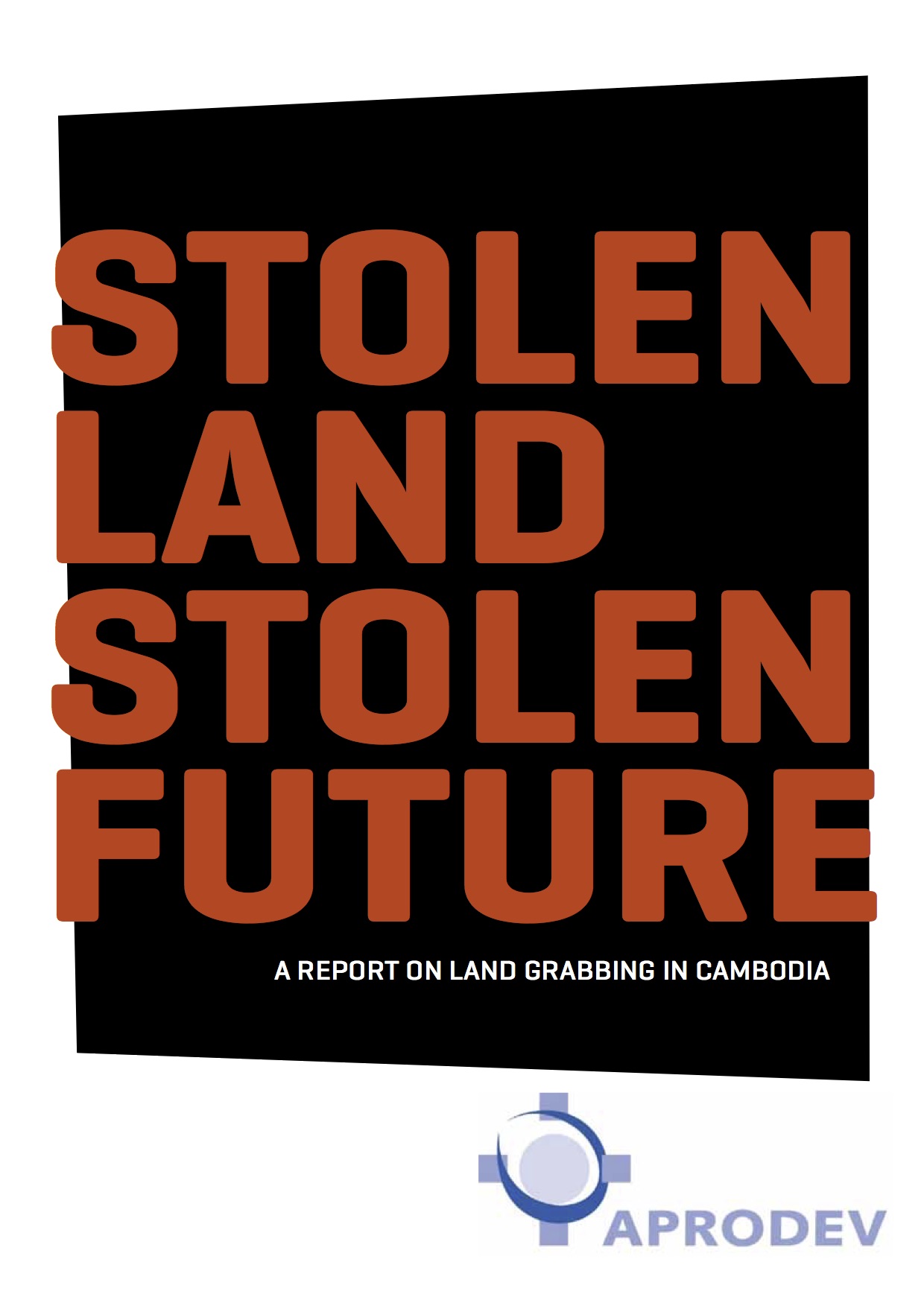
Stolen Land Stolen Future
Publication Year: 2011 / Sources: APRODEVThe focus of this report is land grabbing in Cambodia. it is based on APRODEV Agencies experience from many years of development work. The report documents how affected communities have lost their livelihoods because of land grabbing by national and international business corporations. Local communities have not been consulted and they have received little or no compensation for their loss. The communities have been evicted from their land and have faced systematic human rights violations.
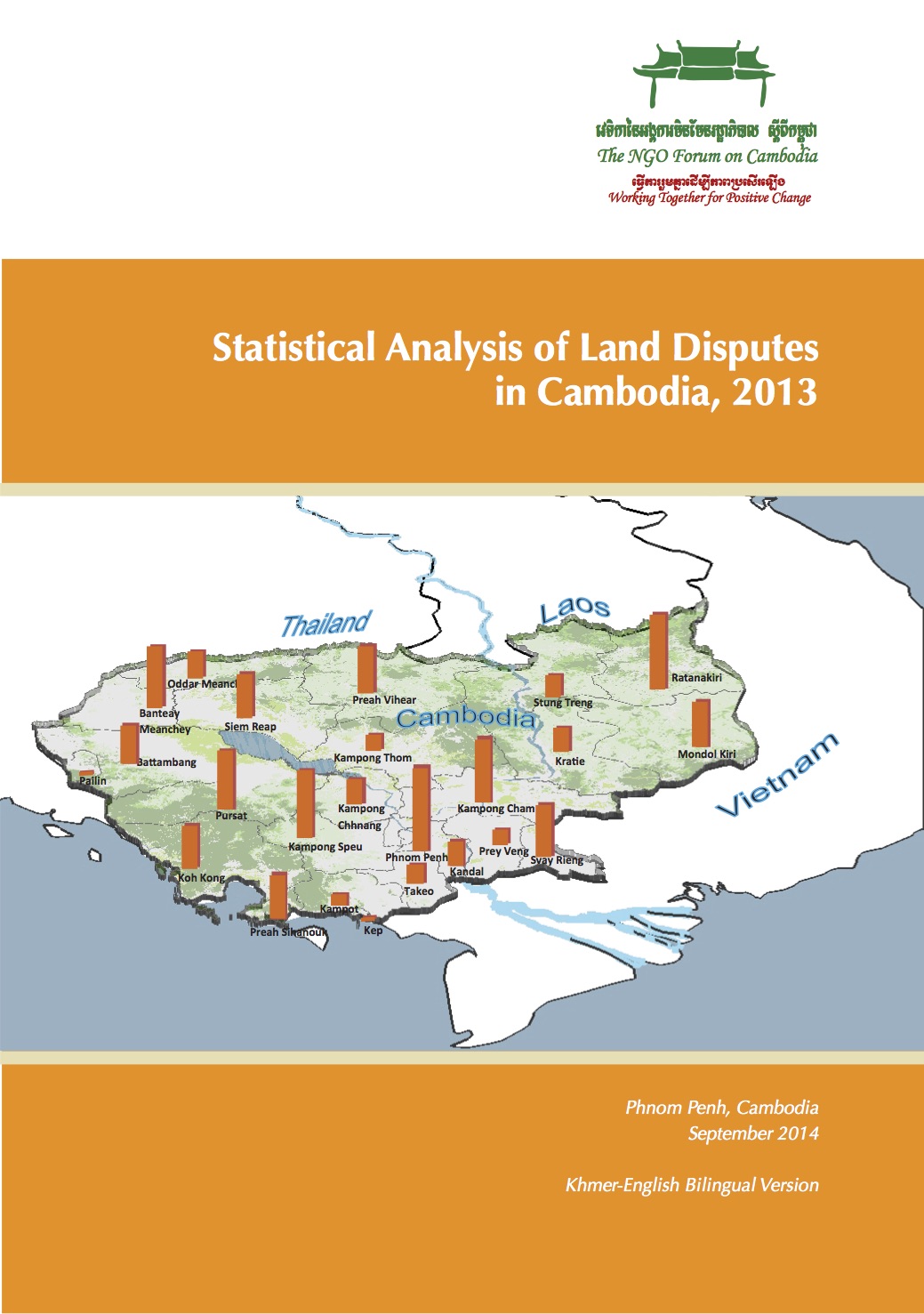
Statistical Analysis of Land Disputes in Cambodia, 2013
Publication Year: 2014 / Sources: The NGO Forum on CambodiaThe purpose of the report is to provide documentary evidence of land disputes recorded throughout 2013. This evidence was gathered from articles on land disputes from local printed media, meetings with Land and Housing Right Network (LAHRiN)2 members, and through on site data collection. This report aims to raise awareness and understanding of the current situation regarding land disputes, and act as a resource for other stakeholders working on land issues, including the government and government officials, donors, LAHRiN members, Cambodian and international civil society and academic researchers, amongst others. The report will also provide documentation that NGO Forum and other groups may use to advocate for improved land tenure security for poor and vulnerable people in Cambodia.
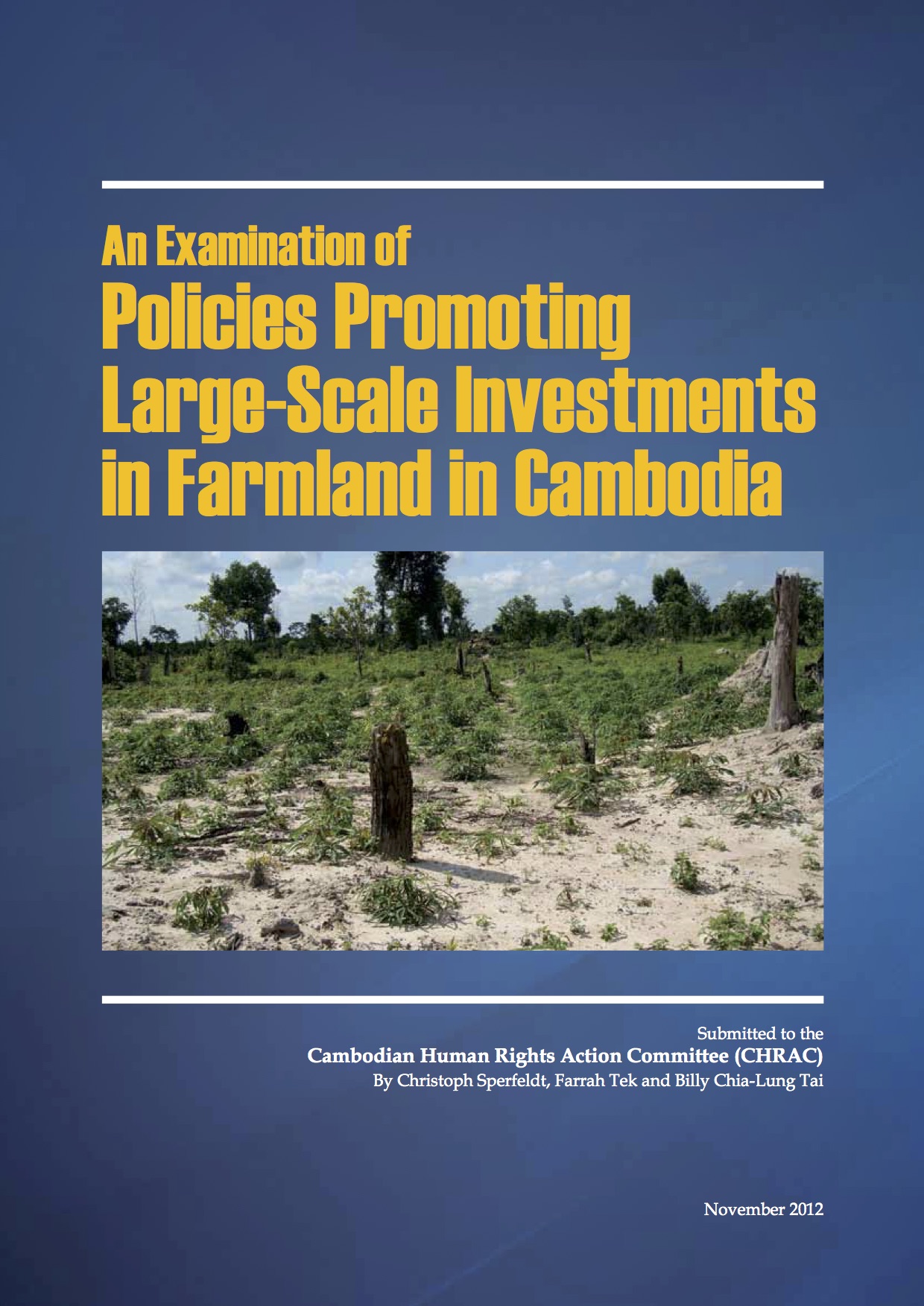
An Examination of Policies Promoting Large-Scale Investments in Farmland in Cambodia
Publication Year: 2012 / Sources: Cambodian Human Rights Action Committee (CHRAC)Against the backdrop of ongoing intense debate in Cambodia about economic land concessions (ELCs) this paper aims to capture the status quo, more than ten years after the adoption of a new Land Law and almost seven years after the promulgation of the relevant Sub-Decree on Economic Land Concessions. It is hoped that a survey- like appeasement of the policies and practices of these land concessions to date will assist stakeholders in Cambodia in developing fresh policy responses to a series of significant challenges encountered until today. The question is to figure whether it is possible to identify a new ‘common ground’. Uncovering such common ground and identifying lessons from past experiences may assist in formulating policy responses to current problems with economic land concessions and possibly present new directions for policy-making. Having this in mind, this paper will focus on the overall policy framework, namely the basic objectives that have guided decision-making in the field of economic land concessions. In doing so, the focus will be on reconnecting this policy with its original objectives, in particular the reduction of rural poverty and rural development, as these objectives constitute the benchmarks against which any progress or failure of these policies should be measured.
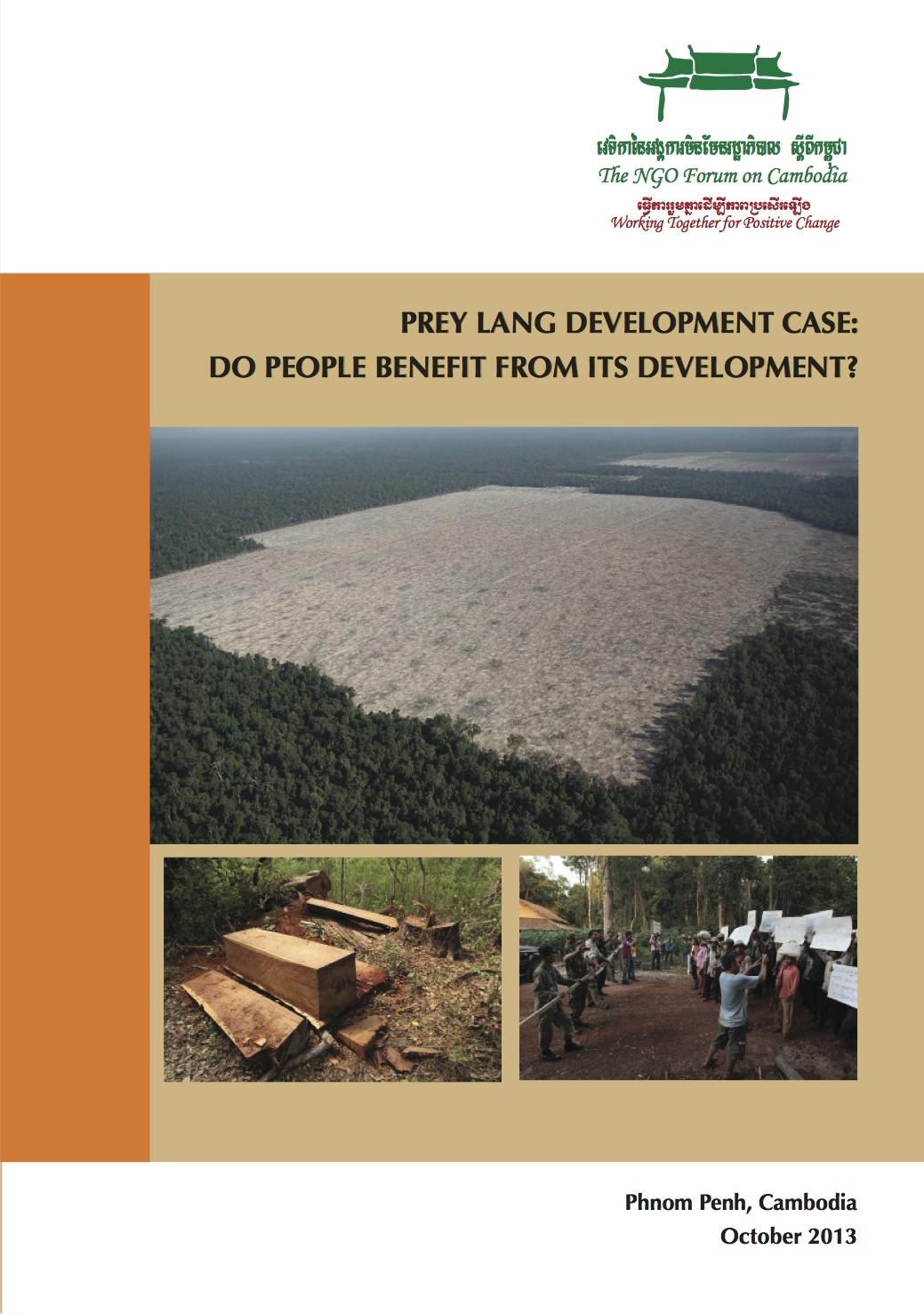
Prey Lang Development Case: Do People Benefit from its Development?
Publication Year: 2013 / Sources: NGO Forum on CambodiaPrey Lang Forest is seriously threatened by Economic Land Concessions (ELCs), mining activities, and illegal logging and clearing, which appear to involve local and provincial authorities on at least some occasions, often with the support of the military and or companies involved in land concessions. Some ELCs are being granted illegally without following existing government legislation, conducting Environmental Impact Assessments (EIA) or consulting with local communities. These communities are losing the traditional lands and resources they rely upon to survive.
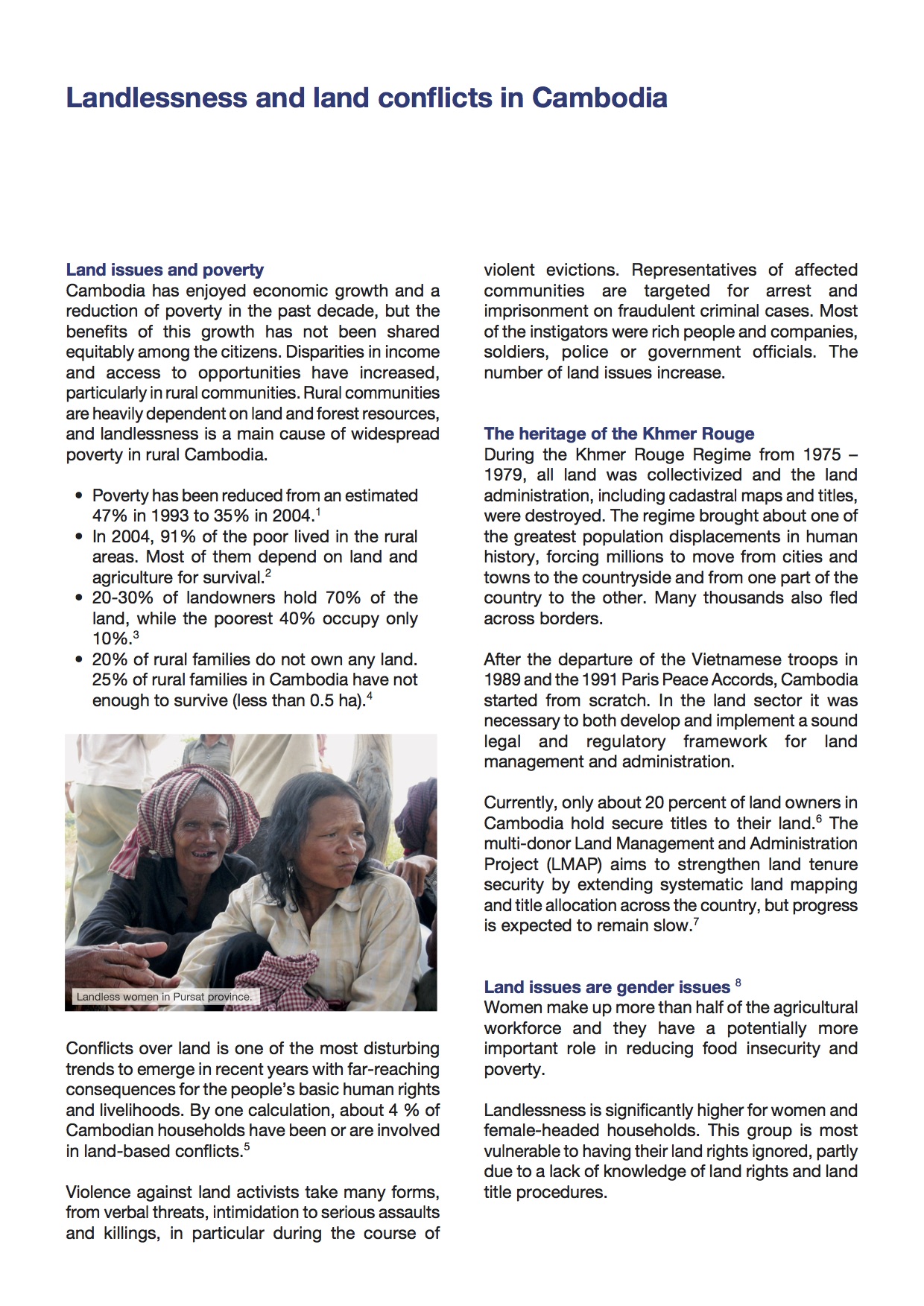
Landlessness and land conflicts in Cambodia
Publication Year: Unknown / Sources: STAR KampucheaCambodia has enjoyed economic growth and a reduction of poverty in the past decade, but the benefits of this growth has not been shared equitably among the citizens. Disparities in income and access to opportunities have increased, particularly in rural communities. Rural communities are heavily dependent on land and forest resources, and landlessness is a main cause of widespread poverty in rural Cambodia.
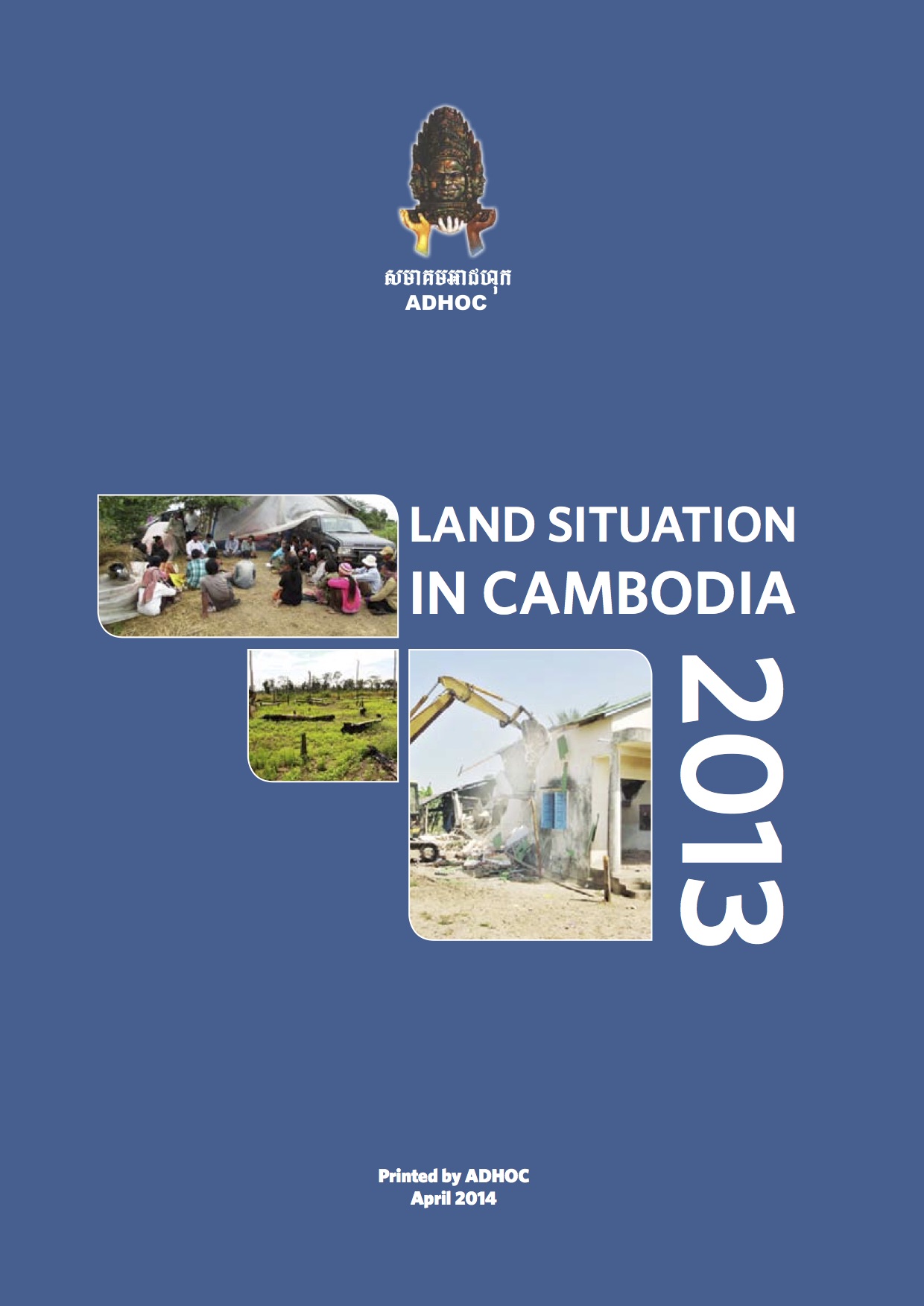
Land Situation in Cambodia
Publication Year: 2014 / Sources: ADHOCIn May 2012 Prime Minister Hun Sen issued Directive 001 (also known as Order 01BB) on ‘Measures to strengthen and enhance the effectiveness of management of economic land concessions (ELCs)’ announcing a moratorium on the granting of new ELCs, the review of existing ELCs and the implementation of the so-called “leopard- skin” (or “tiger-skin”) policy, with the aim to allow communities to live side by side with the concessions. In the framework of the implementation of Directive 001, a new land registration campaign was implemented by youth volunteers to speed up the process of land registration, which had been previously carried out, often ineffectually, through sporadic or systematic registration systems.
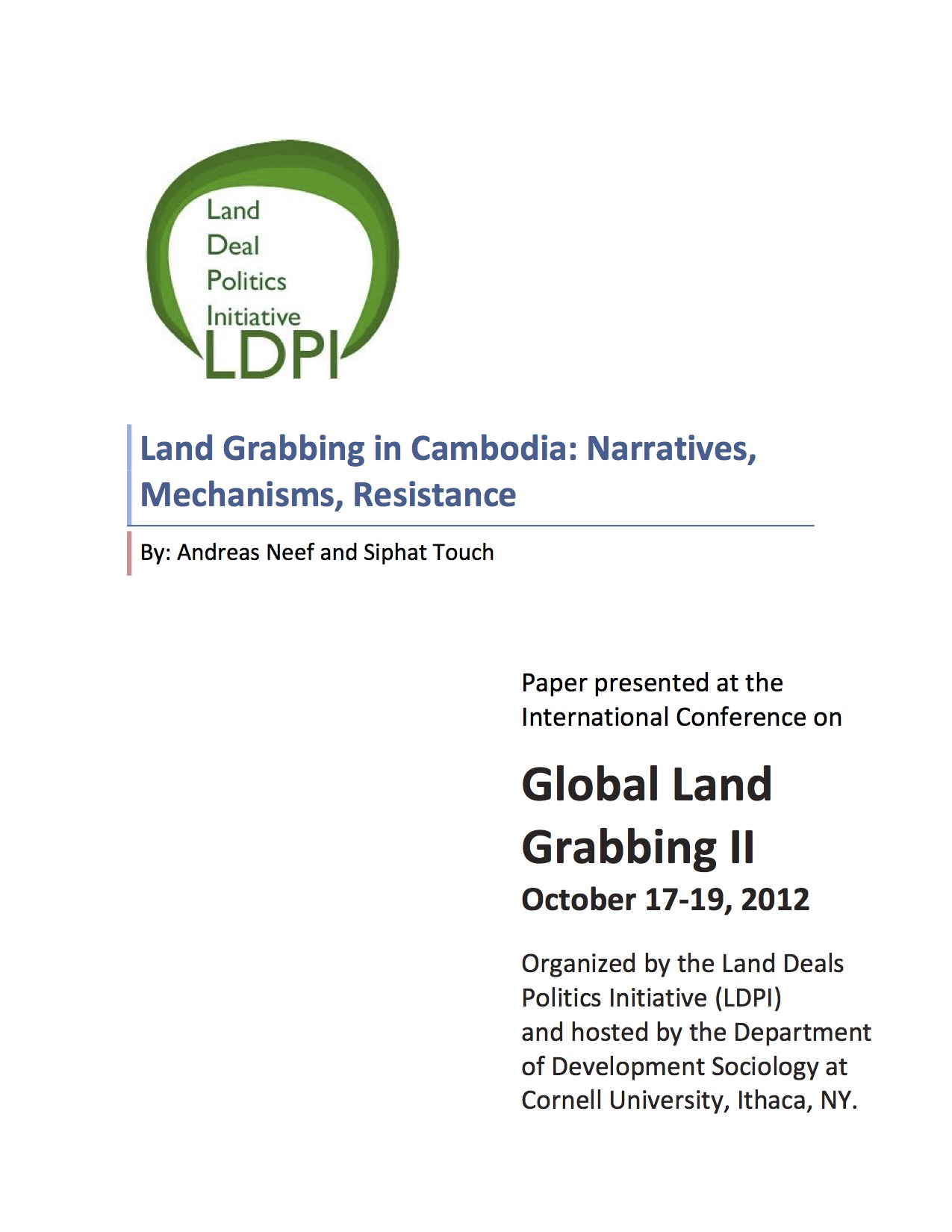
Land Grabbing in Cambodia: Narratives, Mechanisms, Resistance
Publication Year: 2012 / Sources: Land Deal Politics Initiative (LDPI)Rural areas in Cambodia have been the target of large-scale land acquisitions since the late 1990s. As of March 2012, economic land concessions in Cambodia covered more than 2 million hectares, equivalent to over half of the country’s arable land. In this paper, we discuss the policy narratives and discursive strategies that are employed by various actors to justify and legitimize large-scale land acquisitions. We then analyze the underlying mechanisms of such acquisitions and investments and examine how they are entangled with donor-assisted land use planning efforts. Finally, we explore local people’s strategies of resistance.

Land Grabbing & Poverty in Cambodia: The Myth of Development
Publication Year: 2009 / Sources: League for the Promotion and Defense of Human Rights (LICADHO)While forced appropriation of land is a longstanding problem in Cambodia, recent years have seen an explosion in related violations. In cases monitored by LICADHO between 2003 and 2008, a total of 53,758 families fell victim to land-related human rights abuses, including land-grabbing, forced evictions and destruction of property. According to official statistics on the average size of Cambodian families, this represents more than a quarter of a million Cambodians – and that’s just in the 13 provinces and municipalities where LICADHO maintains a presence.
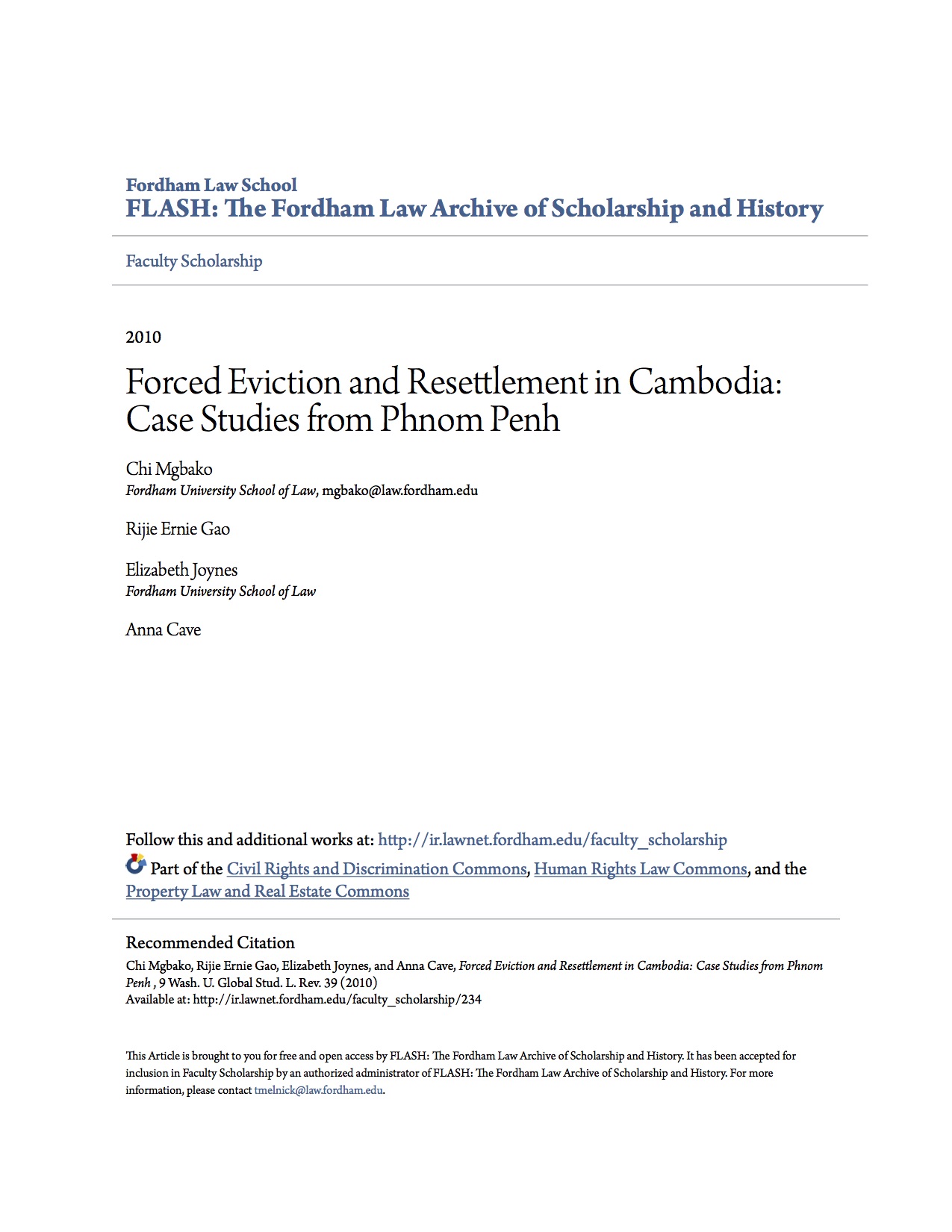
Forced Eviction and Resettlement in Cambodia: Case Studies from Phnom Penh
Publication Year: 2010 / Sources: Fordham Law SchoolThis Article culminates a project undertaken by the Walter Leitner International Human Rights Clinic (hereinafter “Leitner Clinic”) at Fordham Law School to examine the effects of land resettlement on communities that were forcibly evicted or are at risk of forced eviction from their homes, and, in particular, the effects of forced evictions on the Boeung Kak Lake community in central Phnom Penn and on people living with HTV/AJDS (“PLWHA”). This Article is based on field research the Leitner Clinic conducted in Cambodia in the fall of 2008. While in Cambodia, the Leitner Clinic interviewed families from four different communities: resettlement camps in Dam Nak Trayoeng and An Dong; Boeung Kak Lake, where residents are facing forced eviction; and the Green Shelters at Borei Keila where forcibly evicted PLWH1A and their families await resettlement. The Leitner Clinic also met with local human rights and land rights organizations and organizations working with PLWHA.
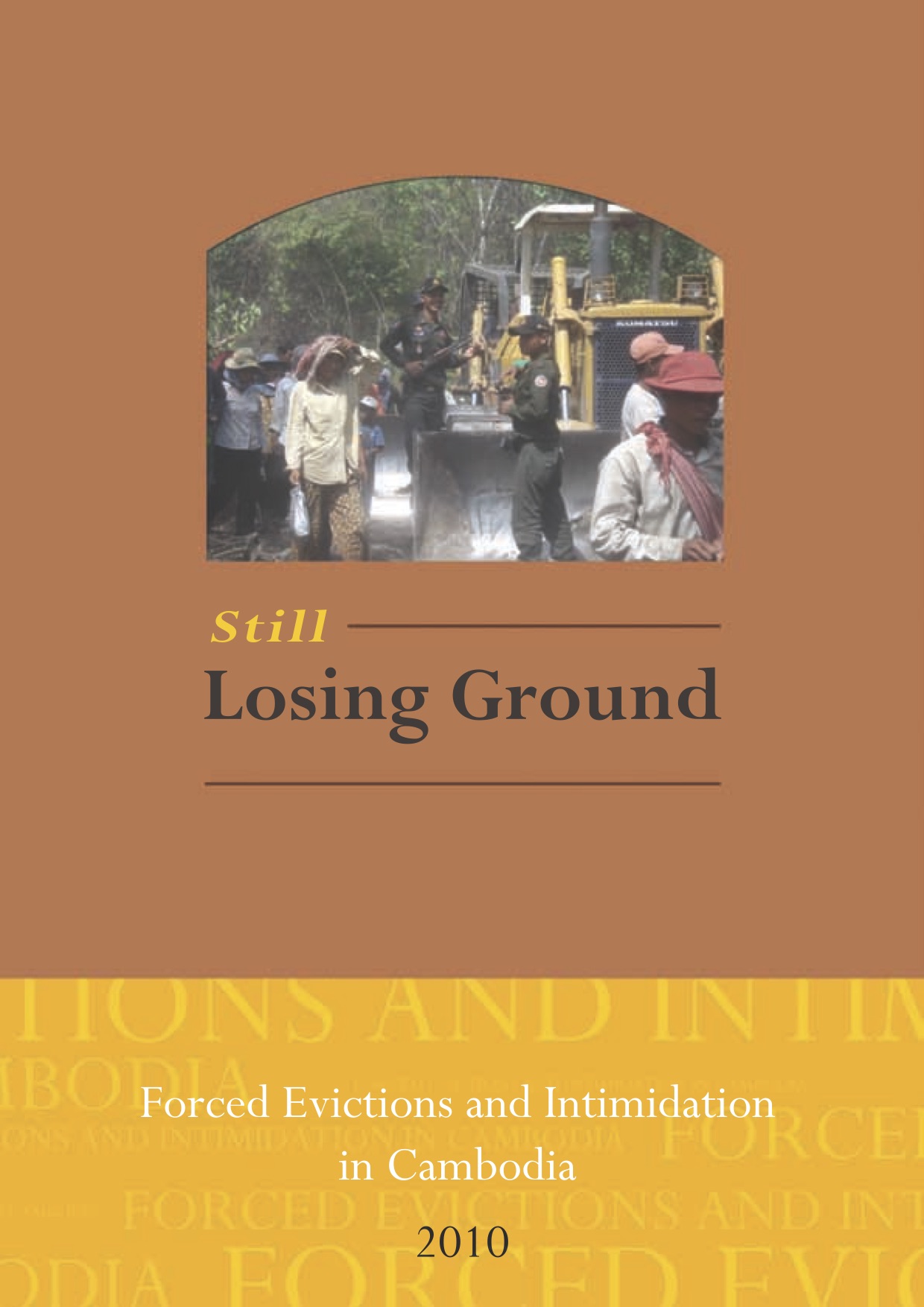
Still Losing Ground
Publication Year: 2010 / Sources: The Cambodian Human Rights Action Committee (CHRAC) and Housing Rights Task Force (HRFT)The case studies covered in this report provide a window into the lives behind the land disputes occurring in Cambodia. This report gives an up- date on the land disputes and villages affected by them, and seeks to address the doubts of people like Grandma Saing and the others quoted above, as well answer the question “what next?” This collection of 11 case studies represents just a few examples of a tsunami of land disputes that have swept across Cambodia generated by industrial “development projects” during the last nearly two decades.
